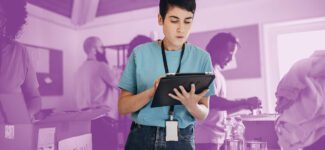In October, the Bonterra Corporate Social Responsibility team (formerly CyberGrants) attended the Association of Corporate Citizenship Professionals (ACCP) annual conference in Denver, CO. After a jam-packed three days spent reconnecting with familiar faces, forging new connections, and attending thought-provoking sessions, it can be difficult to process the abundance of inspiration and ideas generated during our time together. As a result, we asked our very own Lauren McCarthy, VP of product, Corporate Social Responsibility, to reflect on this year’s event and share her key takeaways.
Reflecting on ACCP 2023
It was wonderful to spend time sharing ideas with fellow social good leaders and enjoy the Rocky Mountains as our backdrop—thank you to the ACCP team for another incredible event!
After a meaningful week in Denver, I spent some time reflecting on the current state of the corporate philanthropy sector and how we can apply conference learnings as we head into 2024. Here are a few of my early thoughts and perspectives.
Proactive disaster relief continues to be imperative.
It feels like ACCP continually falls during times of urgent crisis for the global community. Last year, we were recovering from Hurricanes Fiona and Ian. This year, attendees were consumed with the crisis in Israel and Palestine, and how best to galvanize their resources and employees to support those suffering. Registrants held many conversations around how to identify organizations providing the most effective on-the-ground support, and how to spin up matching campaigns to channel funds quickly and successfully.
But it’s no surprise that the timing of the conference often lines up with emerging global crises. The reality is that the next crisis is always around the corner, and CSR teams need to be prepared to respond quickly and effectively. Rather than thinking about disaster response, we need to shift our mindset to disaster preparedness. As we approach 2024, I urge your teams to consider the tools and programs you can implement now so that when the next crisis hits, you can quickly spin up a campaign and rally your workforce behind it. With this mindset, you’ll be able to support affected communities with speed and agility.
Impact reporting frameworks have shifted for the better.
Onsite at the conference, I joked with my colleagues that my next tattoo might just have to be the word “impact” because of how frequently it was used. All jokes aside, the desire to understand your company’s impact within the communities it serves isn’t a new or emerging idea. As a CSR leader, your key stakeholders have always required you to report program outcomes and demonstrate ROI.
Historically, reporting impact meant tracking dollars contributed, hours logged, or goods donated. At ACCP, it became clear that this is no longer enough. Leading corporations and foundations don’t just want to know how much was donated; they want to pinpoint exactly how those funds made a difference. Similarly, it’s not just about how many dollars your employees donated, or the number of hours logged; it’s about the types of causes they supported, and the way different cohorts participated. This kind of data unlocks a new way to think about impact and allows you to deliver better, more tailored programs.
As your teams begin to plan for 2024, consider how you can expand the data you’re looking to capture and how you define impact. You may find that your current practice for tracking progress, measuring success, and reporting impact is only scratching the surface!
Invest in strategic ERGs for more meaningful outcomes.
One of my favorite moments from this year’s conference was partnering with Alexandra Dailerian, VP, Impact & Inclusion, Comcast for our workshop, Empowered Employees: How ERGs Promote Inclusive Corporations. If you were able to join our session, thank you for attending! If you missed it, we discussed Employee Resource Groups (ERGs), which are voluntary, employee-led groups that aim to foster a diverse, inclusive workplace and build a greater sense of community. They typically align with a shared identity, background, or experience as they work to lead programming that informs and amplifies the histories of their community.
We were honored to have a lively session with tons of audience engagement! This created a space for CSR leaders to share their learnings with each other and helped us all look at ERGs through a fresh lens. Below are my biggest takeaways from the discussion:
-
Do it right or not at all: Don’t just implement ERGs to check off a box on your DEIB to-do list. Invest in a meaningful program with a clear strategy and goals in mind.
-
Engage employees in the process: As you build an ERG strategy, it’s essential to consult your workforce. Ask your teams what groups they’d like to join, how they’d like to be managed, and the type of activities they’d want to support.
-
Encourage collaboration: Incentivize your ERGs to partner with each other for cross-group events, activities, and discussions.
-
Identify partner nonprofits: Collaborate with ERG members to define nonprofit partnerships, and champion those organizations through giving campaigns or volunteer events.
-
Demonstrate impact: Showcase the success and impact of your ERG programs through corporate and external websites. This is a great way to highlight your employees’ hard work and the nonprofits that they collaborate with.
If you’re considering incorporating ERGs into your company’s overall CSR strategy for next year, take these learnings back to your teams and leverage them as you build your program. Plus, you can access the full presentation here for additional proof points, insights, and recommendations. Use these to make your case for ERGs in 2024!
Looking ahead
I’m so grateful to the team at ACCP for creating a space that encourages CSR professionals to connect, share ideas, and unlock new ways to drive social good. Thank you to everyone that we connected with, and those who attended our session—I’m looking forward to continuing our conversations. In the meantime, if you’re looking for ways that Bonterra can support your philanthropy efforts—from employee giving and volunteering to grantmaking—I encourage you to browse our resources or connect with an expert. I look forward to seeing you all again soon!




